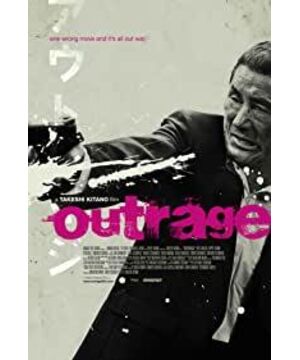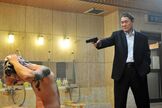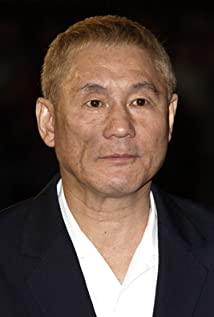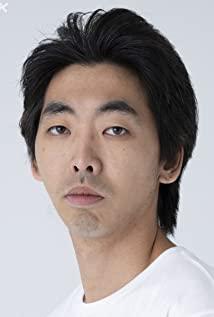Why do you want to "cut your fingers?"
Takeshi Kitano once said, "Real violence is painful." The fingers are connected to the heart, cutting fingers is the best way to express violence, and it is also the best way to apologize for the strict Japanese underworld. It's just that the times are different, the old guys who abide by the Taoism are all too late, and it is imperative to change the dynasty. Cutting the fingers also slowly lost its meaning (that is, the Tao), but the source of all evil never stopped. The author thinks this is a question that Kitano Takeshi wants to discuss, why should he cut off his finger?
There are three finger cuts in the film. A level is also displayed, which are Xiao Fei at the bottom (the fuse of the event), Kimura in the middle (the upgrade of the event), and Otomo (the center of the event) swinging from side to side.
At the beginning of the film, the camera swept across the team and members of the club from right to left, Otomo (played by Takeshi Kitano) was just one of them, but the camera stayed there, telling us the core of the film's characters. The internal structure of the underworld full of anger, betrayal and conspiracy will be reshuffled, and Otomo is the best executioner.
The first one to cut his fingers was Xiao Fei. His little cleverness of extortion and extortion can only be regarded as a joke to the boss. The first turning point of the story is that Xiao Fei fell into the trap of the Dayou Group and had to cut off his finger and apologize. This kind of behavior is only under the pressure of power and pressure, and there is no choice. Xiao Fei's life is cheaper than that of ants. Finally betrayed by a friend, as the train passes through the tunnel, gunfire in the dark declares death.
The second person to cut his fingers was Kimura. He is the leader of Xiao Fei and the second-in-command of the Murase group. I was instructed to apologize, but I encountered Dudu's persuasive and aggressive Dayou group. His behavior, relatively speaking, is the most traditional one, for the sake of his boss and his own dignity, he gnawed his steel teeth and swallowed it in his stomach. This also reflects a national character of the Japanese, which is unimaginable endurance. Kimura, whose face was scratched, finally managed to survive, and the gentleman took revenge. It was not too late for ten years, and he ran into Dayou again in prison.
The third person to cut his fingers is Otomo. In fact, he is very simple, he does whatever is instructed, and he lives neatly. It's just that he didn't know that he was just a chess piece at the mercy of others and slaughtered by others. After cleaning up the Shimizu group for the Chi Yuan group (the excuse is that the godfather is supreme), he eradicated Chi Yuan for the president (the excuse was the appointment of a horse), in the meantime, offended people on both sides, was used, and exiled. At the cusp of the storm, Otomo had to come up with the traditional method of "cutting his fingers" in an attempt to get forgiveness. The author thinks that there is a kind of last resort mentality in Otomo's behavior, and give it a final try. It's just that Kato (Miura Yukazu) dismissed him with a single word, saying that "broken fingers" are outdated. So far, Dayou no longer believes in the word "Dao". What awaits him is the betrayal of his boxing brother as a teenager (a police officer who colluded with the underworld). It is worth noting that Takeshi Kitano finally chose to put on handcuffs and the prison stadium under the blue sky and white clouds. Takeshi Kitano watched his favorite baseball game in his life, very serene, which also symbolized Takeshi Kitano's mentality in his sixtieth year. "Let go". But who knows, being stabbed to death by the long-awaited Kimura is quite surprising. The author thinks that this is actually the concept of "living to death" that Takeshi Kitano upholds. You can surrender, but cause and effect are intertwined. It's like a baseball game formation, which is circular at first, but is always changing. This is another manifestation of "Tao".
In short, Takeshi Kitano made a great "compromise" in this film. He borrowed the words of the characters in the play and said: The era of gangsters is over, and living is the greatest revenge. "Extremely Wicked" seems to announce the last "finger-cutting" era of Takeshi Kitano's films.
In addition, there are many interesting details in the film. The first is a kind of "contrast" that runs through the whole film, such as the speed of punching between Otomo and the police officer, telling us that no one can always prevail and will always go downhill. Then there is Mizuno who threw a cigarette butt twice at the door of the police station. There were many warning signs erected in front of the door, representing many problems in Japanese society. There were even traffic signs like "Never stop for three minutes, not for a second". This is a more complicated analogy. Inside the police station, the soldiers and bandits colluded, but outside the police station, they were sanctimonious. As a representative of the underworld who opposes the system, Mizuno's writing of throwing a cigarette butt is the biggest resistance, provocation, and even contempt. However, in the end, he couldn't go upstream and end up with the worst way to die.
There is also a comparison between Japanese and English. In Japanese society, it is said that most Japanese people cannot speak English well or even speak English. Therefore, the two English-speaking Japanese people in the film are labeled as "disguise", which is very cunning. Ironically, when the Negro and Ishihara's embassy car was about to pass Luca, the Japanese were very difficult to speak English, and the foreigners were very effective in Japanese.
Then there is the "sarcasm" and "representation" that fill the whole film. The casino can be built in the Japanese embassy of a small African country, relying on a kind of "hegemony", to make black people submit to him arrogantly and unreasonably. Outside the casino, "Long Live Independence" is written impressively. Isn't this a great ridicule? How to speak of independence.
There are two black people in the film, one is a white powder seller on the street (it may also be a Middle Easterner), and the other is an ambassador. Regardless of social class, they all seem to be "slaves" to the Japanese, which may be why the film is so controversial. This also reflects, on the one hand, the bullying side of the Japanese nationality. There is even such a line in the film, "Our income in the embassy casino is more than your country." Also, the scene of "chopping knives cutting off fingers" and "chopsticks in ears" caused by the drug business, why? Arranged at a Chinese restaurant, which is also debatable. Takeshi Kitano himself also admitted that in this film, he gave each character a definition of "country", some representing Japan, some representing the United States, some representing African countries, some representing Iran, and admitted that Ishihara in English is a reflection of modern Japan. Watching the film in combination with his point of view is worth our deep thinking. The author believes that Takeshi Kitano's insight into the world is quite sharp, but he stands on different opposites. We cannot fully accept the views expressed by him.
Finally, here are some highlights that I observed in the film. 1. The tattoos are riddled with holes. 2. House number "2011". 3. The "Avenue" in the film appears twice, one is coming and the other is the direction of going. 4. The Japanese pronunciation of that African country is Gu Ba Nan, which should be non-existent. 5. Some of the music in the second half of the film is very retro, reminiscent of the soundtracks of Hong Kong police and bandit films in the 1980s and 1990s. 6. In the film, Takeshi Kitano changed his taciturn style and became wordy, and the messy office has a tendency of "Eleven Angry Men".
View more about The Outrage reviews










